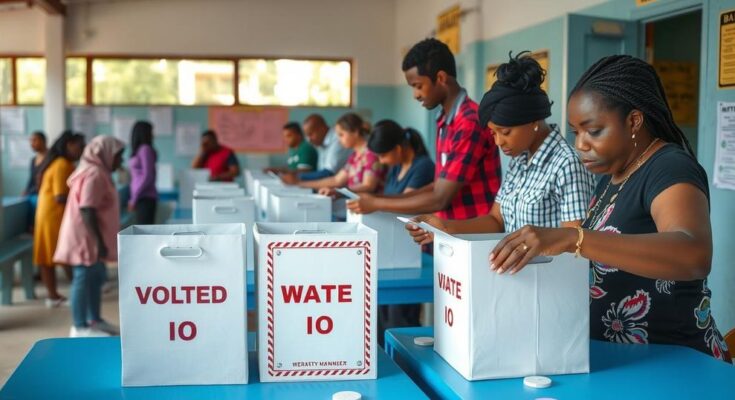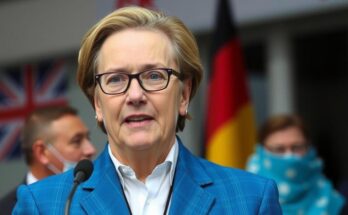Voters in Comoros are electing members to the 33-seat parliament amid allegations of electoral fraud surrounding President Assoumani’s previous re-election. Approximately 338,000 voters are registered, with nearly 100 candidates contesting. Opposition factions, divided between boycotting or participating in the elections, express concerns over Assoumani’s potential dynastic ambitions. Election results are expected by Friday.
Citizens of Comoros have commenced voting to elect representatives to the 33-seat parliament of the Indian Ocean archipelago. This electoral process unfolds one year subsequent to the re-election of President Azali Assoumani, whose victory was claimed by the opposition to have been tainted by significant irregularities, claims that have been officially dismissed by the ruling party. Polling stations opened on Sunday, with approximately 338,000 registered voters, while parliamentary elections had not been held since January 2020. Nearly 100 candidates have been approved by the Supreme Court to vie for these parliamentary seats.
President Assoumani, who has governed Comoros since ascending to power through a coup in 1999, has faced accusations from opponents of authoritarianism. These critics are particularly concerned that he may be positioning his eldest son, Nour El-Fath, to succeed him following the conclusion of his current term in 2029. In a significant move, Assoumani bestowed substantial powers upon his son in 2024, assigning him oversight of all government activities.
While some opposition factions, like the Juwa party led by former President Ahmed Abdallah Sambi—who was sentenced to life imprisonment in 2022—have advocated for a boycott of these elections, other parties have opted to participate. Hamidou Karihila, a candidate for the opposition group Hope of the Comoros, expressed the view that engaging in the electoral process serves to highlight the existing flaws within the regime and could precipitate its decline. The official results of the elections are anticipated by Friday.
The political landscape of Comoros has been turbulent, characterized by a coup that brought President Azali Assoumani to power in 1999. Over the years, Assoumani has maintained a grip on power through successive elections, with the opposition alleging electoral fraud and misconduct. In the context of heightened political tension, the current parliamentary elections represent a significant opportunity for change. The opposition’s call for a boycott indicates deep dissent against the ruling administration, reflecting fears regarding a potential dynastic succession with Assoumani’s son. This election marks a crucial moment for both the government and the opposition as they navigate the future of Comorian governance.
The parliamentary elections in Comoros are taking place against a backdrop of political tension and allegations of electoral misconduct. As citizens exercise their right to vote, the outcome may determine the stability of Assoumani’s regime and shape the future political landscape. The responses from both the ruling party and various opposition factions illustrate a society grappling with questions of governance and representation. Results from the elections are eagerly anticipated, which will reveal the electorate’s sentiments in this pivotal moment.
Original Source: www.singletonargus.com.au




